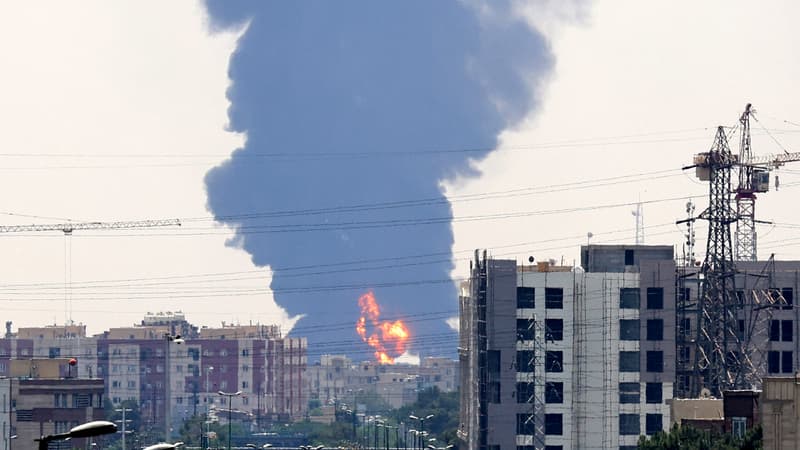Hydrocarbons markets are immersed in war fog. Oil and gas prices continue to fluctuate, almost a week after the beginning of the Israeli offensive in Iran, while the hypothesis of an American intervention persists.
Petroleum lessons rise slightly this Wednesday, June 18, strengthening the strong increase recorded on Tuesday, after the exclusion of all Iranian surrender by Ayatollah Ali Khamenei in its conflict with Israel. The price of European gas also progresses with these tensions.
At 3 pm, Brent barrel prices were around $ 75, compared to $ 68 last Wednesday (+10%). This should increase prices in the pump in France of 7 cents per liter in the next two or three weeks (taking into account that an increase of $ 1 of the barrel corresponds approximately to 1 cent to the pump).
This increase remains measured compared to risks, while 20% of world oil production passes from the Iranian coast through the Ormuz Strait.
At this stage, maritime transport is not significantly disturbed in the area. The ships continue to circulate there. However, this situation can evolve.
Kharg’s strategic island
Prices could clearly upload if some Iranian oil facilities were attacked by Israel. Despite US sanctions, Tehran has managed to maintain high exports, mainly addressed to China.
The American site Axios significantly mentions the possibility of Israeli attacks on the small island of Kharg, near the Iranian coast, where 90% of the oil exported by Tehran’s transits.
Black gold is stored there in very close tanks of each other. This could facilitate their destruction and considerably restrict the possibilities of exporting their hydrocarbons.
An intense activity on Kharg island has been informed since the beginning of the Israeli offensive.
Iranian exports would have increased by 44% compared to the same period last year, according to TankerTrackers.com data, a company specialized in the surveillance of illegal oil companies that, therefore, closely follow Iranian activities, cited by Bloomberg.
The hypothesis of Israeli attacks on the island had already been mentioned last October, during a previous confrontation between Tehran and Tel Aviv.
Iranian oil scarcity would probably have an ascending effect on oil prices. A Goldman Sachs analysis believes that barrel prices could rise up to $ 90 after the loss of Iranian production, then fall around $ 60 per barrel in 2026 as the offer is recovered, reports the New York Times.
In a note consulted by BFM Business, Deutsche Bank plans a more moderate scenario, with a reduction of only 50 % of Iranian exports without important interruptions.
In this case, the outbreak of oil prices would be limited to the environment of current levels. This is the hypothesis held at this time by the market according to German bank analysts.
“Barrel to $ 124”
The most feared scenario remains a blockade of the Ormuz Strait by Iran. According to Deutsche Bank’s calculations, a closure for two months could carry the prices of Brent Barrel to $ 124 in the third quarter of 2025.
This level has not been reached since 2012 (the historical record is $ 145 per barrel in July 2008). This order of magnitude is confirmed by Stephen Innes, of SPI AM, who talks about a possible price at $ 130.
In this hypothesis, prices would be oriented upwards a relatively long period. The Deutsche Bank only predicts a yield of less than $ 90 at the end of 2026. This would certainly be a pressure on global, already slow growth.
China’s weight
However, such blocking would penalize Iran, by altering their oil exports, important for its fragile economy. They would also be annoying for China, the main Iranian black gold importer.
Beijing buys this oil, directed by American sanctions, with a discount, which allows you to feed your economy with a cheap fuel.
Above all, China and Asian countries in general are the main oil clients extracted in the Middle East. 75 % of the oil that passes through the Ormuz Strait is to Asia, says the International Energy Agency In your 2024 report. It is the same for liquefied natural gas flow (LNG). Therefore, a blockade of the Strait would be very penalizing.
“Iran will not be able to close the Ormuz Strait without a plan B to continue providing China,” TankerTrackers confirms in X. confirms.
Without going as far as the closure, the conflict could interrupt traffic, increasing the cost of insurance or the rental of oil tankers.
Source: BFM TV


